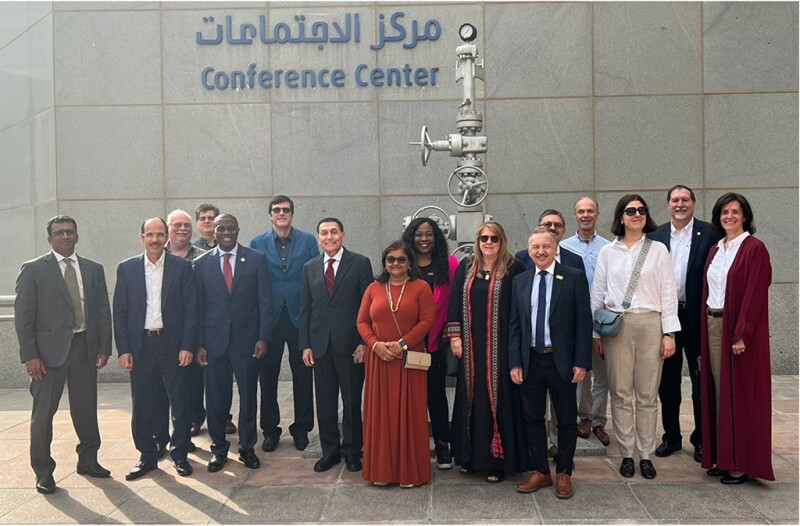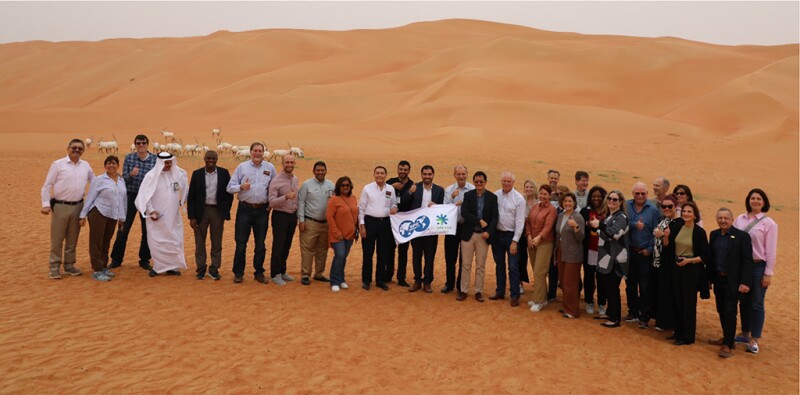SPE has named Simon Seaton as New CEO.
In this month’s column, I will share news on the recent SPE Board of Directors meeting in Saudi Arabia and SPE’s utilization of artificial intelligence (AI).
The first of the Board’s quarterly meetings of the year is usually held virtually where several administrative items are discussed and the nomination process for the new Board members gets started. The last meeting of the year is held in conjunction with the SPE Annual Technical Conference and Exhibition (ATCE). The middle two meetings are usually held in areas with significant industry operations that gives the Board an opportunity to meet the leaders of SPE sections and regions. The spring 2023 meeting was held for the first time in Dhahran, Saudi Arabia.
Below are some of the key decisions reached at the meeting.
- Approved the nominating committee’s recommendations for the 2025 SPE President—Olivier Houzé; Data Science and Engineering Analytics Technical Director—Sushma Bhan; Asia Pacific Regional Director—Hazli Sham Kassim; Europe Regional Director—Pierre Emmanuel d’Huart; Latin America and the Caribbean Regional Director—Carlos Alberto Pedroso; North American Regional Director—Kim Oracheski; and the Russia and Caspian Regional Director—Alexey Borisenko. More information about these volunteers was published in the April JPT.
- Approved the budget for SPE’s fiscal year 2024, which runs from 1 April 2023 to 31 March 2024.
- Reviewed the activities for selling the building in Richardson, Texas.
- Updated the process for countries/sections that wish to be considered for an exception to the membership dues.
- Removed the requirement for students to provide a full technical paper for participation in the Regional Student Paper Contest.
- Approved SPE CCUS International Conference and Exhibition, October 2023, in Al Khobar, Saudi Arabia.
- Formed a work group to develop a long-term plan for SPE’s flagship event, ATCE.
- Approved SPE policy on AI-generated content in publications (details on the policy are available here).
- Updated the Charitable Contribution Policy when SPE donates to areas where our members are affected by natural disasters like hurricanes and earthquakes.
In conjunction with the meeting in Dhahran, Board members attended the monthly meeting of the Kingdom of Saudi Arabia Section, with about 500 members, to discuss local and Society-level activities. Saudi Aramco arranged for the Board to visit the Shaybah field operations and the natural wildlife sanctuary in the Rub’ al-Khali, or Empty Quarter.
It is interesting how the challenges of operating a large oilfield facility in a remote area like the Empty Quarter are like what I used to see with operations of the Prudhoe Bay and Kuparuk fields in the North Slope of Alaska. It is telling the extent of what we do to provide the world with energy it needs when at airports like in Anchorage next to the counters of United, American, and Alaska Airlines, there were counters for ARCO, BP, and ExxonMobil.
The next Board meeting in July 2023 will be held in Kuala Lumpur. I am looking forward to connecting with our colleagues at Petronas as well as other employers and stakeholders in the area.

Artificial Intelligence at SPE
In my April column, I started discussing the use of AI to provide resources to our members. I would like to expand on this topic with more specific information about SPE’s uses of AI.
As you would expect, many of SPE’s IT systems now use AI technology to improve efficiency, but SPE has been using AI behind the scenes as an important tool to deliver on its mission since 2015.
SPE utilizes natural language processing (NLP) to read, characterize, and enrich the content from our website, OnePetro, JPT, TWA, PetroWiki, and Energy Stream. The system is industry-aware and able to determine the concepts being discussed rather than just looking for keywords or phrases. Since terminology varies over time and by geography, the technology is sometimes described before terms for it are even adopted. This ability is especially important for a global society like SPE which has papers going back to the 1880s.
The information from this AI system is fed into other member-facing systems behind the scenes, such as OnePetro, to help people find the content they are looking for more easily but it is also accessible directly on SPE’s research portal. The portal generates summaries of content when no summary or abstract is available, categorizes the content according to multiple taxonomies to make it easier to filter to what an SPE member is looking for, recommends filters based on the user’s actions to speed up searches, enriches the information by determining concept tags and oilfield places, and has analytics capabilities which allow researchers to do basic analysis of the content right on the platform. Transcription capabilities are in the works which will allow people to go straight to specific content within videos and podcasts, saving time.
The obvious next step is to provide specific answers to questions rather than simply listing the papers or articles which contain the answer then leaving the reading exercise up to the user. For the past year, we have been working on this type of capability with our partner, and in mid-March we launched a trial to test question answering (QA) trained on PetroWiki content. Yet again, we proved that we have a fantastic volunteer community at SPE with 200 members volunteering to test the system on the first day the opportunity was posted in the volunteer portal.
Open AI’s ChatGPT is fundamentally changing expectations about what is possible, but the technology behind a generative pre-trained transformer (GPT) like ChatGPT precludes tracing the answer back to the original source, which we believe is critical for an engineering society like SPE. We are taking a hybrid approach which provides a conversational answer to questions like the GPT models but maintains the reference to the original source so the answer can be validated.

During the trial, the testers created well over 1,000 questions which the system answered in multiple fashions:
- An excerpt from PetroWiki with the answer highlighted (citing source)
- A conversational-style answer generated based on the PetroWiki content (citing source)
- ChatGPT’s answer to the question (no source)
Several volunteers ranked each set of answers according to what they felt best answered the question. ChatGPT fared very well on these general questions, which isn’t surprising given the broad base of knowledge it is trained on. Though the answer was sourced from the same place, the testers consistently preferred a conversational answer to the excerpts with highlights. The next step in the QA trials is to train the system on OnePetro and SPE Connect content and run a second trial with questions which more closely resemble real-world research as well as “how to” questions. Pending successful trials, SPE will be rolling this capability out as a member benefit later this year.
I hope this gives you a brief update on some of the key AI advances SPE is using to serve our members today and in the near future.
The possibilities for how AI can help SPE deliver on its mission are exciting and, as for any new technology, we can’t fully imagine all the creative ways AI will be used to serve our members in the future. For example, to get you thinking about possibilities, the same AI system can be used to compare an individual’s technical experience to the requirements for a new role or position the member is interested in and map out both training and video recommendations for the individual to be qualified for that role.
I want to thank John Boden, SPE vice president, information and member services, for his contribution to this column.
Until next month!


